Joe Blow: Joe Dumars and His 10 Worst Moves For The Detroit Pistons Franchise
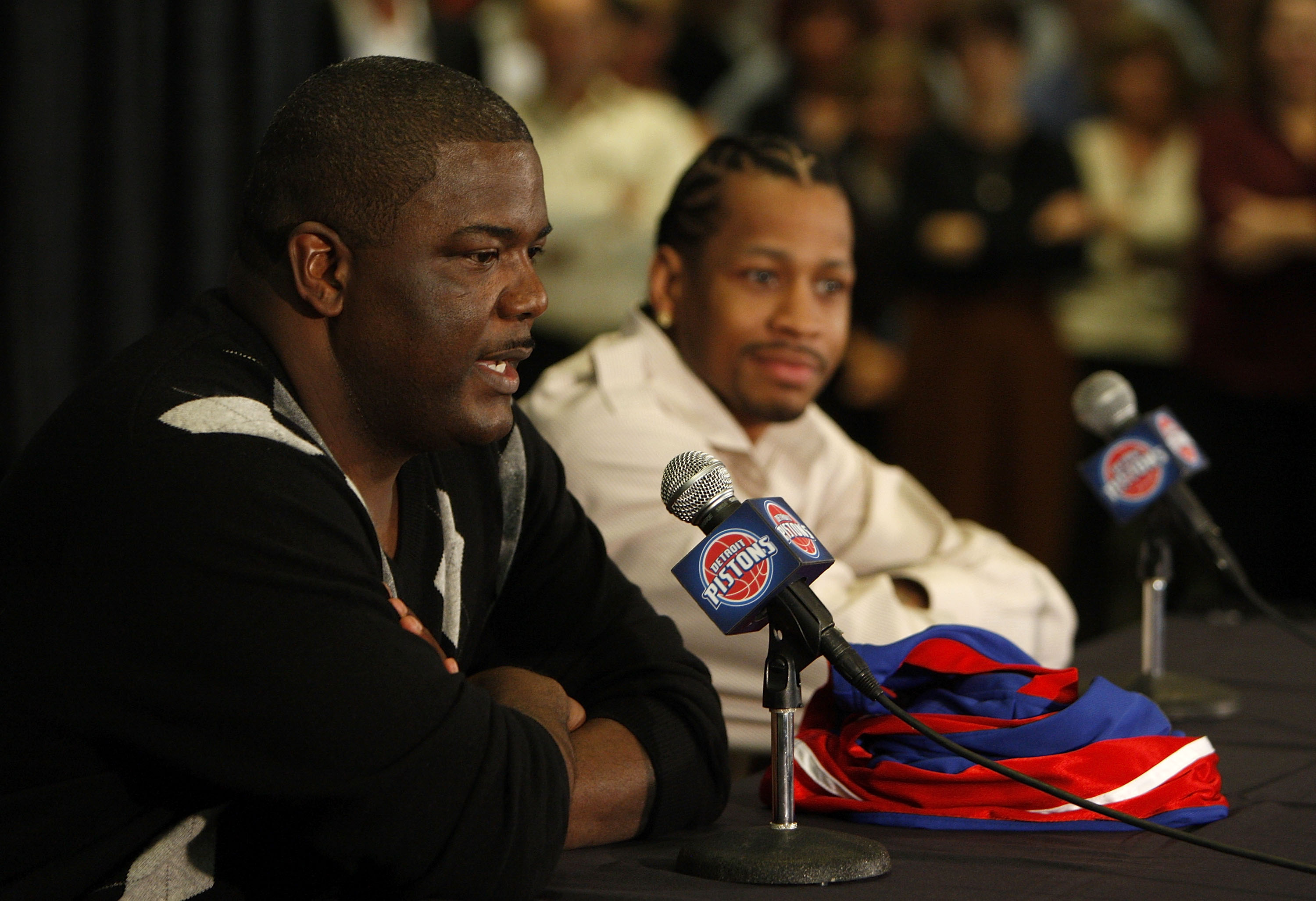
Detroit Pistons GM Joe Dumars with acquisition Allen Iverson.
Gregory Shamus/Getty Images
https://bleacherreport.com/articles/577265-joe-blow-joe-dumars-and-his-10-worst-moves-for-the-detroit-pistons-franchiseCOLIN SHEAJANUARY 19, 2011
COLIN SHEA - JANUARY 19, 2011
Joe Dumars brought NBA Championship back to Detroit. For that, he deserves much praise and adoration. But, understand, he does not deserve a free pass because of it. No GM over the past decade has been a better embodiment of Dr. Jekyll and Mr. Hyde than Joe D, and as a Pistons fan, nothing is more frustrating than an unpredictable decision-maker.
To the detriment of Detroit fans, most of Dumars' lackluster moves have been bunched together over the past few seasons. As quickly as Joe built the bond of trust between him and the city, he is doing everything he can to destroy it. With a few small shreds of leniency remaining, Dumars has only a year or two left to turn this franchise around, and he will need to start by not committing mistakes like these.
No. 10: Drafting Austin Daye at No. 15 Overall in The 2009 NBA Draft
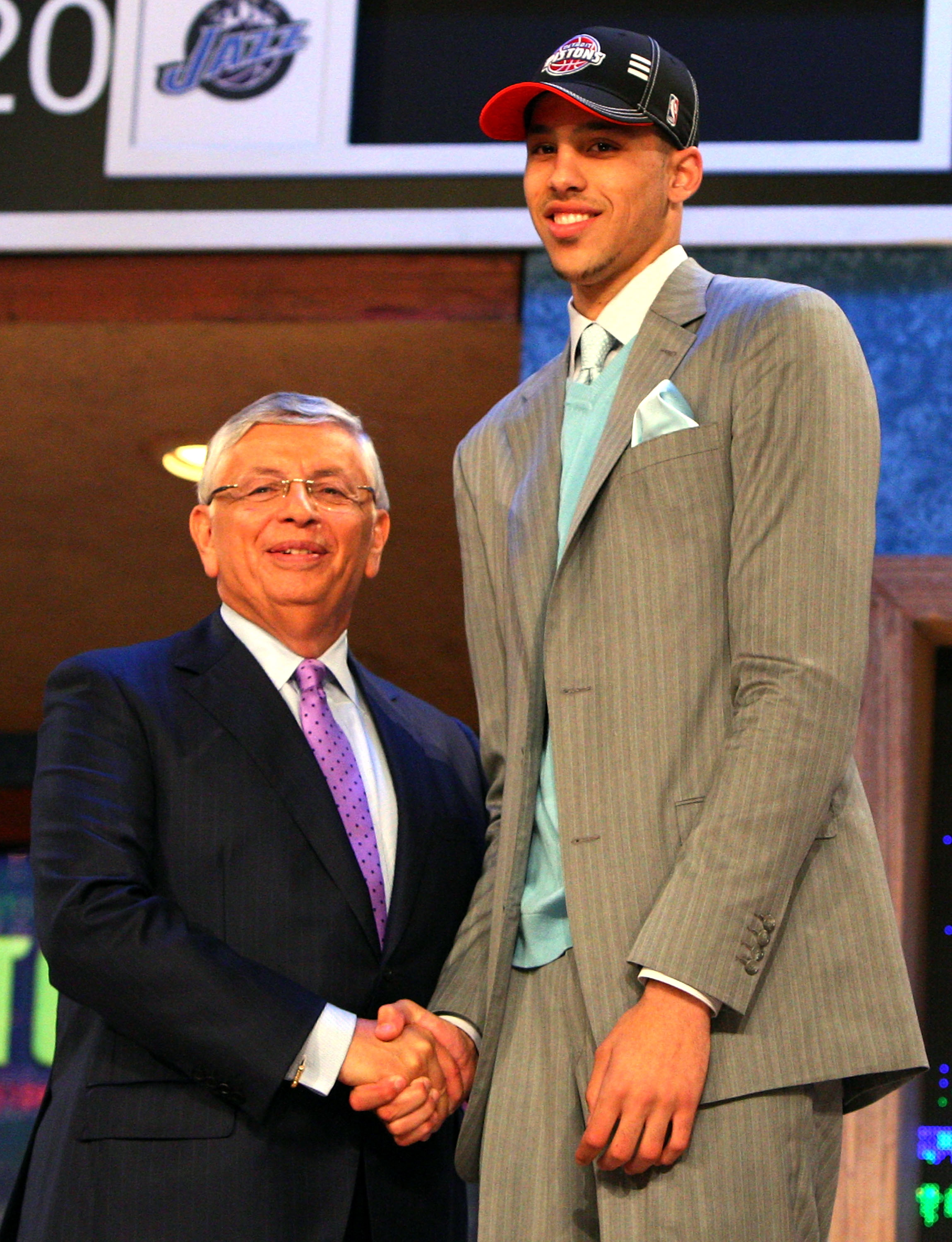
Austin Daye of the Detroit Pistons, drafted #15 overall in 2009.
Jim McIsaac/Getty Images
At the start of the 2009-2010 season the Pistons were entering a year in which they lacked the services of All-Star point guard Chauncey Billups for the first time since 2001. Content with the future of the "Rodney Stuckey Experiment" Joe Dumars chose Gonzaga forward Austin Daye with the fifteenth overall pick. At 6'11, 205 lbs. Daye presents many offensive match-up problems on paper. In reality, Daye boasts a high school body-type, much like that of Tayshaun Prince, but without the deceptive strength of his fellow teammate. Without the post moves and defensive tenacity of Prince, the Gonzaga product has yet to mold himself into the team's future small forward once Prince leaves via free agency.
Regardless of Daye's own production, the real problem with this pick was the fact that Dumars passed on three quality point guard prospects, all of whom were selected among the four picks following Daye. With Ty Lawson out of North Carolina, a player with a winning pedigree and speed unmatched by any other guard prospect in years, Eric Maynor out of Virginia Commonwealth, and Darren Collison of UCLA still on board, Dumars chose not to address the glaring hole left by discarded Detroit-hero Chauncey Billups.
In the past two seasons all three point guards have become some of the best young talents in the league—Lawson ironically backs up Chauncey in Denver and provides a scary change of pace off the bench, Darren Collison now runs the offense for Indiana after having a monster year in place of the injured Chris Paul for the Hornets last season, and Eric Maynor is carving out more and more minutes behind Russell Westbrook in Oklahoma City. As a result of the Daye choice, the Pistons have now moved Rodney Stuckey to the shooting guard position while thrusting aging veteran Tracy McGrady to the point guard spot.
---
No. 9: Hiring Michael Curry in 2008
Most of what happened during Michael Curry's season as Pistons head coach was not his fault—it was Joe's. Four games into the season Chauncey Billups, the heart and soul, the rock, and the face of the Pistons organization was traded to Denver. In return the Pistons received hard-headed playboy, Allen Iverson. This was an incredible burden to force upon a first-year head coach. Iverson was difficult enough for a seasoned coach like George Karl to control, so what did Dumars think Curry would be able to do with him? Could Curry have done a better job? Yes. But Dumars didn't do him any favors.
Coinciding with the departure of Chauncey, came the start of the "Rodney Stuckey Show". Without a true point guard running the offense, the team struggled mightily, posting their worst record since the 2001-2002 season and ending their impressive run of six consecutive Eastern Conference Finals appearances.
Coinciding with the departure of Chauncey, came the start of the "Rodney Stuckey Show". Without a true point guard running the offense, the team struggled mightily, posting their worst record since the 2001-2002 season and ending their impressive run of six consecutive Eastern Conference Finals appearances.
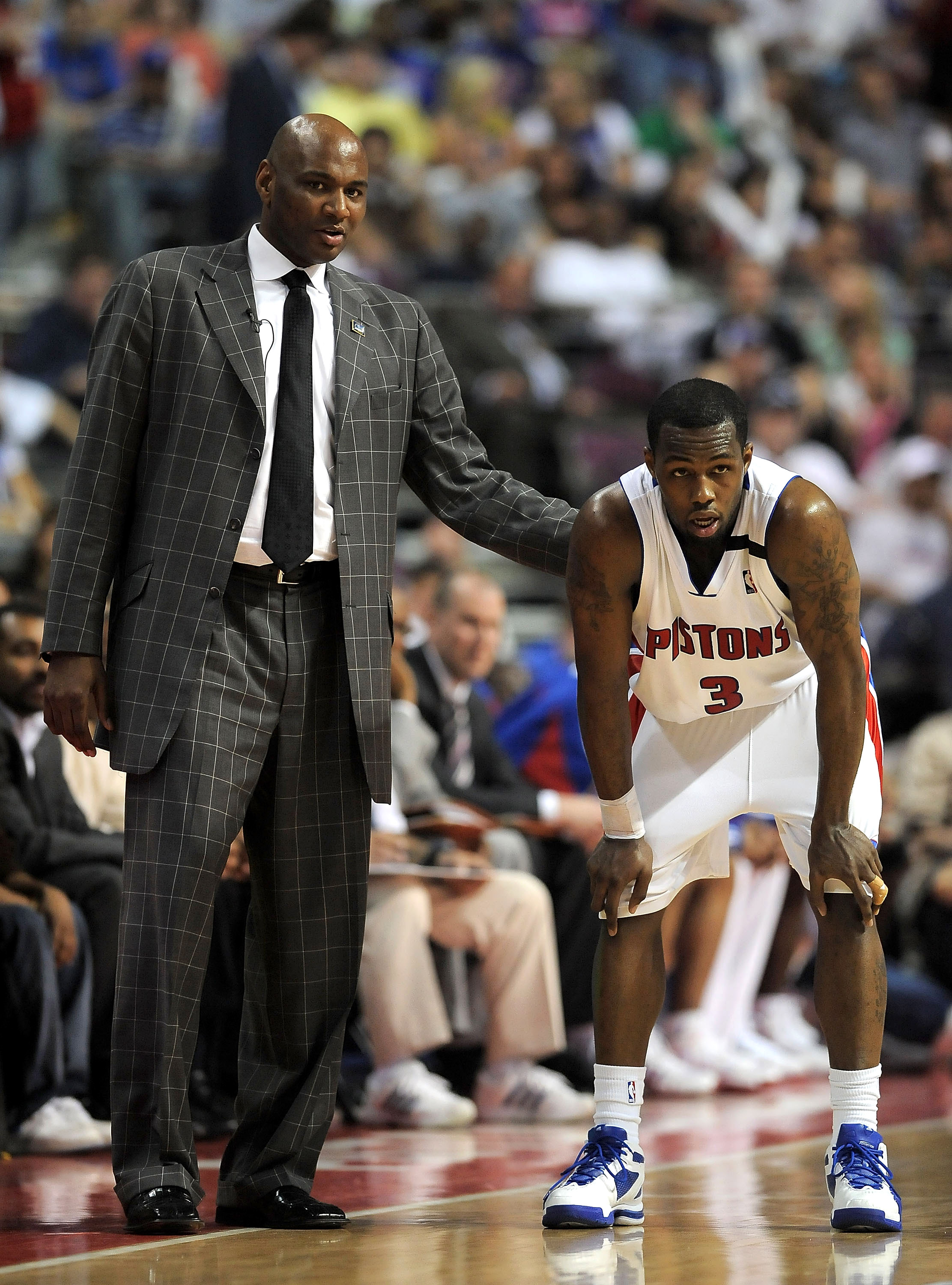
Michael Curry, ex-Pistons head coach, with Rodney Stuckey.
Gregory Shamus/Getty Images
---
No. 8: Cutting Ties With Darko Milicic Too Early
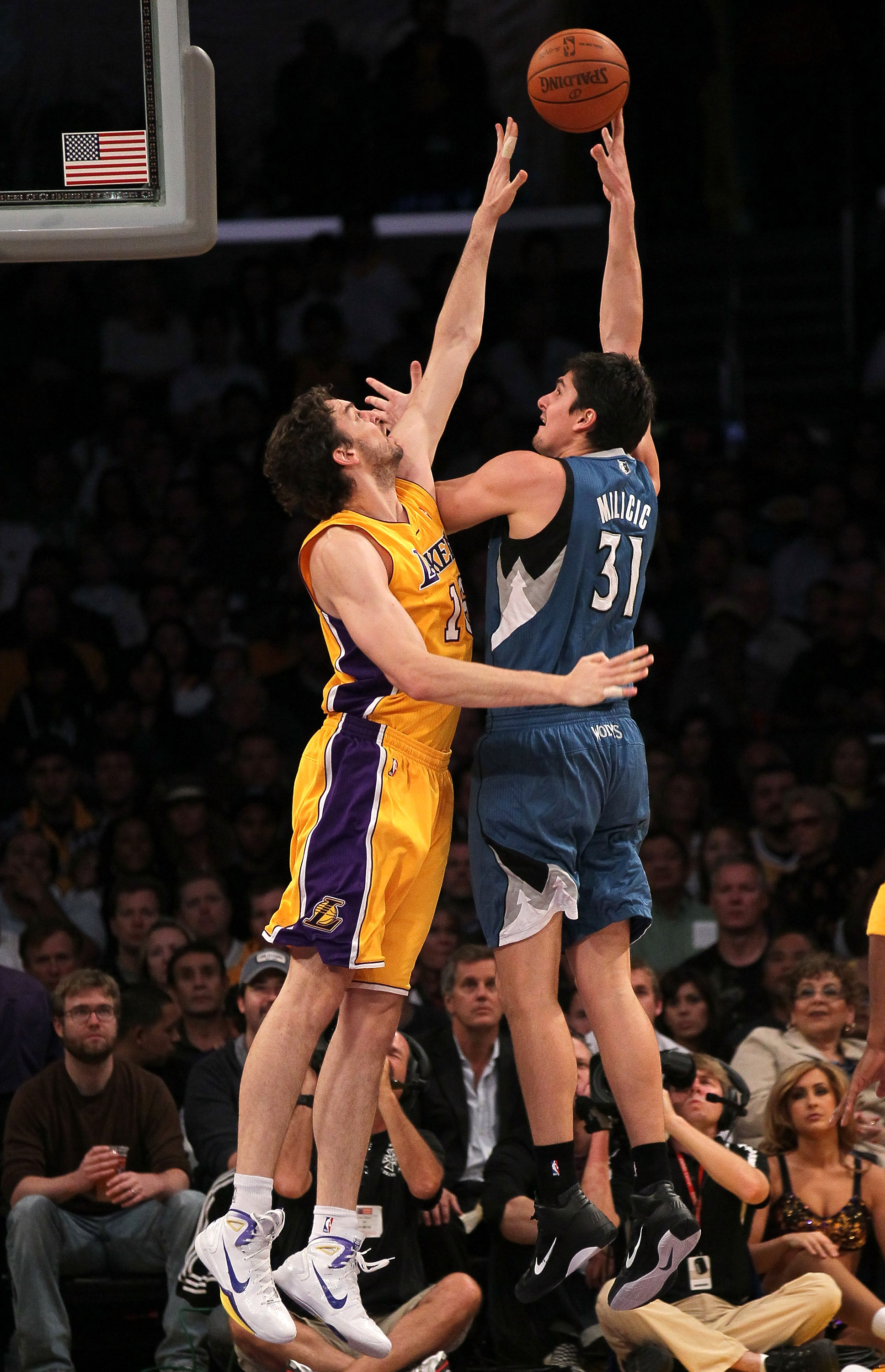
Darko Milicic dropping a hook shot over All-Star Pau Gasol of the LA Lakers.
Stephen Dunn/Getty Images
It's no surprise to any NBA enthusiast that one of Dumars' biggest blunders involves the selection of 7'0 Serbian international Darko Milicic, but that will be addressed later. Another problem, less debilitating, but important nonetheless, is the recent success Darko is experiencing with the Minnesota Timberwolves. Prior to the 2010 season the T-Wolves shocked the free agent market by signing Milicic to a four-year, $20 million contract. After proving nothing with the Pistons, Magic, Grizzlies, and Knicks many people were perplexed by the amount of faith put forth by the Wolves. But, with foot-in-mouth, those viewers have had to stand quietly and watch as Milicic posted a line of 23 points, 16 boards, five assists, and six blocks against the defending NBA champion Los Angelas Lakers.
The talent was always there. With an impressive combination of size and athleticism, scouts always saw Darko as a special prospect. Much like Kwame Brown in Washington, Darko seems to have been drafted into a lose-lose situation with the Pistons. Playing behind Ben and Rasheed Wallace, Mehmet Okur, and Corliss Williamson during the glory years, Darko may not have gotten the attention he needed when first entering the NBA.
After bouncing around the league he has now found a home where production has followed. As a No. 2 overall pick, Dumars should have done more to work his talents into Detroit's system instead of allowing him take his talents elsewhere.
With the ninth overall selection of the 2001 NBA Draft, Joe Dumars drafted Rodney White out of the University of Charlotte. Who's Rodney White? Exactly. Allow me to sum him up in one sentence—he started 21 games in four total seasons in the NBA.
Drafted immediately after White was Joe Johnson, a sophomore from Arkansas. As a recent recipient of a massive six-year, $119 million contract from the Atlanta Hawks, Johnson figures prominently among the premier players in the league.
Richard Jefferson, drafted four slots behind White, has been an offensive juggernaut since he entered the league. To this day he still remains an important piece for the NBA-leading San Antonio Spurs.
The last of the players who could have became a Piston is Zach Randolph, a Michigan native out of Michigan State University. Instead of providing a needed post presence in Motown, he has posted double-double seasons six times during his tenures in Portland, New York, LA, and now, Memphis.
Joe Dumars has a great history of finding players late in drafts (Okur, Prince, Stuckey, Maxiell), but when it comes to impact picks at the top of the draft, Dumars has yet to hit the homerun necessary to build a dynasty.
---
No. 7: Drafting Rodney White Over Rich Jefferson, Joe Johnson, and Zach Randolph
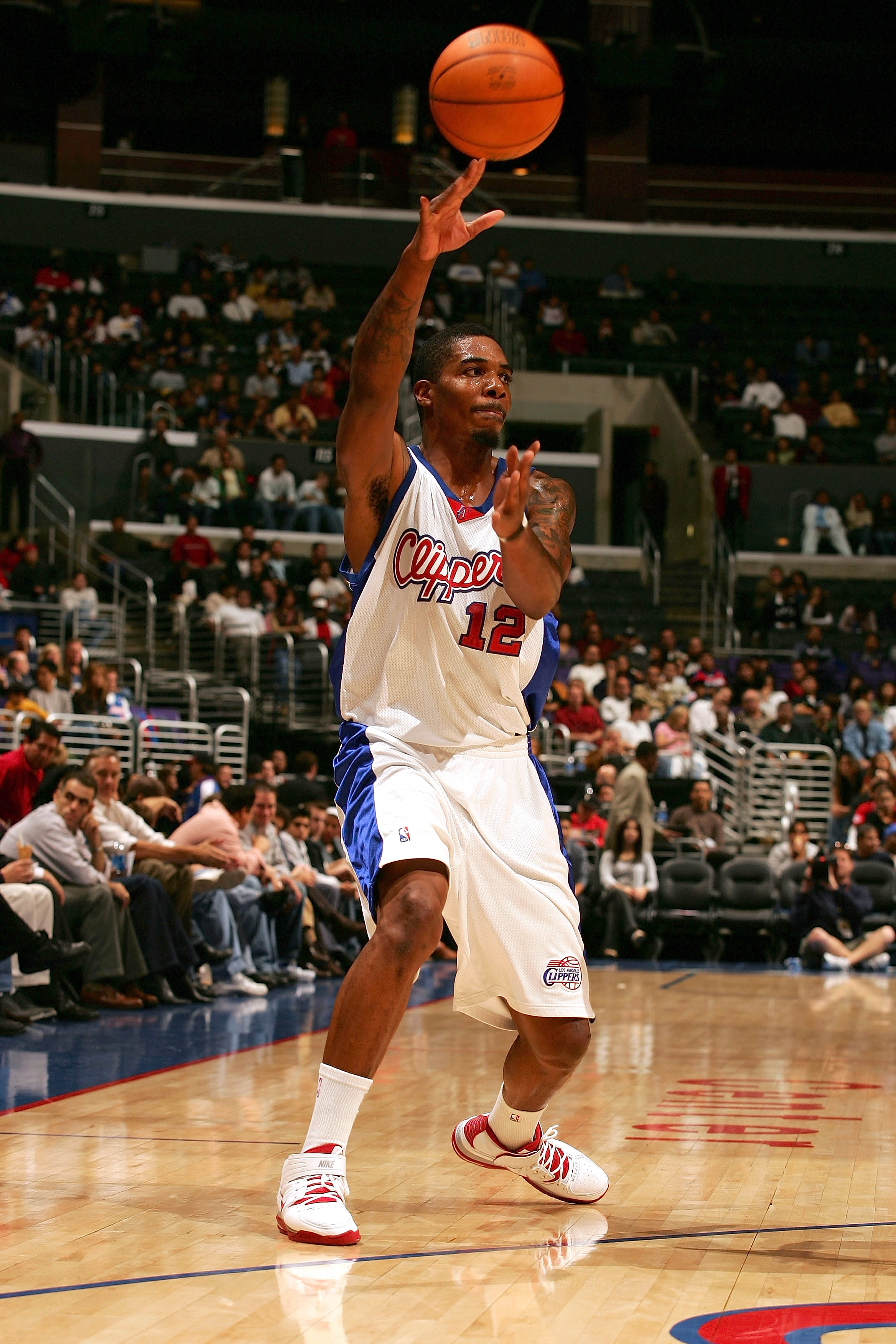

Detroit Pistons draft pick Rodney White, playing for LA.
Robert Laberge/Getty Images
---
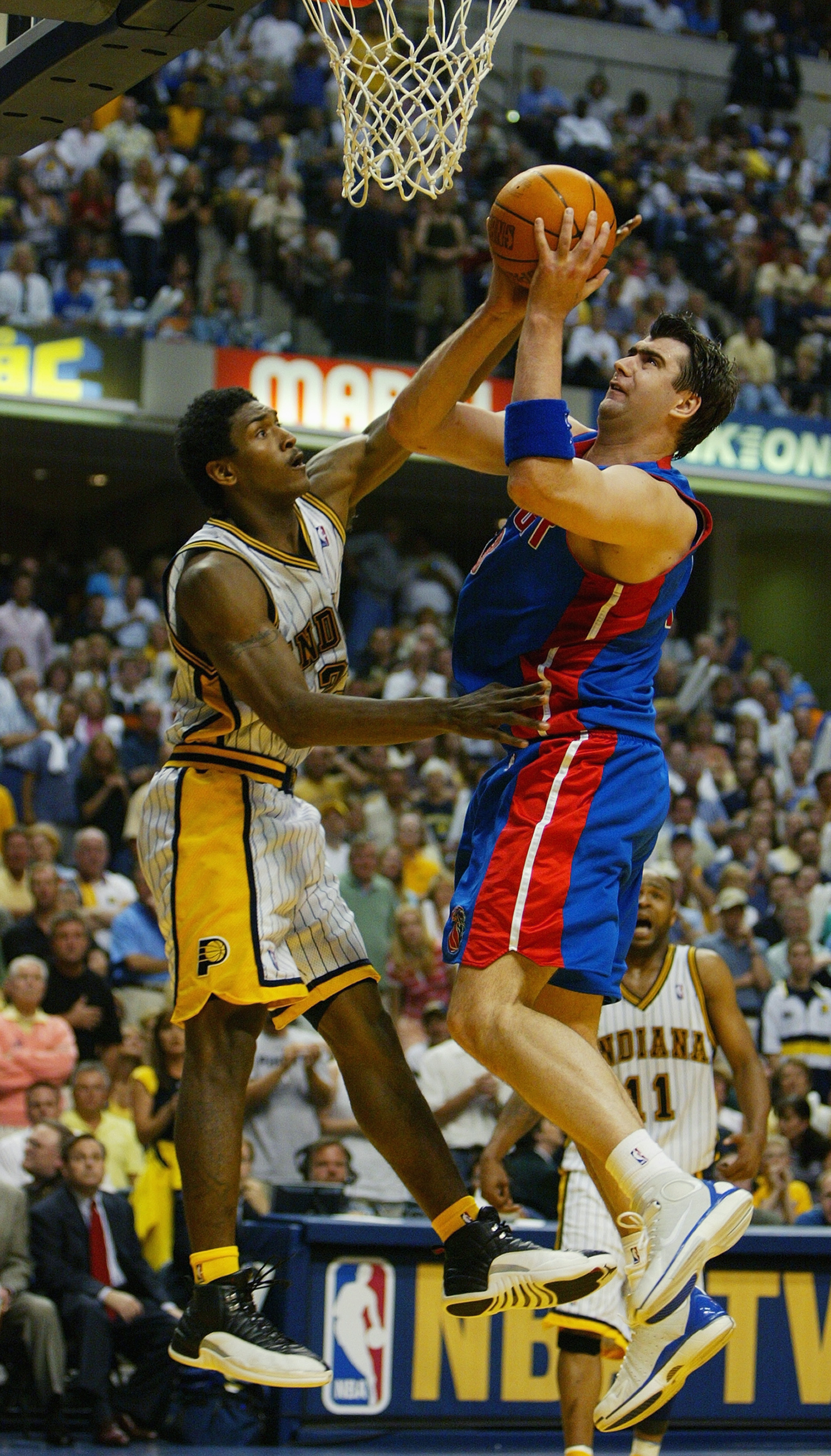
Mehmet Okur takes on Ron Artest under the basket.
Andy Lyons/Getty Images
As one of Dumars' diamond-in-the-rough draft picks, and an important piece on the 04' championship squad, Mehmet Okur ended up being one of Joe D's short-lived masterstrokes. After the NBA Finals victory against Kobe, Shaq and the Lakers, Mehmet bolted for a starting spot and a hefty paycheck in Utah. He served Detroit for only two seasons before leaving during free agency.
The Pistons front office chose less-expensive avenues instead of re-signing the Turkish Tower. Okur went to the Jazz where he signed a six-year contract worth $50 million. As replacements for Okur's departure, the Pistons signed Antonio McDyess and re-signed Rasheed Wallace, who turned 31 that season. The problem is that Wallace served the purpose for which he was brought to Detroit—he provided the final piece to a championship team on the brink. He was a quick answer to our immediate need under the post. Okur waited in the wings to replace Wallace when his contract ran out, but instead of handing the forward position to Mehmet, Dumars re-signed the aging Wallace who was never really able to replicate his initial impact.
Two years after their NBA title and Okur's departure, defensive stalwart Ben Wallace defected to Chicago. Now, the Pistons were left with a depleted front court, the need for Okur's versatility on offense was amplified. By being more concerned with finances and loyalty to Wallace, Joe Dumars sacrificed the future of the Pistons's front court for years to come.
---
No. 5: Re-Signing Richard 'Rip' Hamilton To a Three-Year Extension
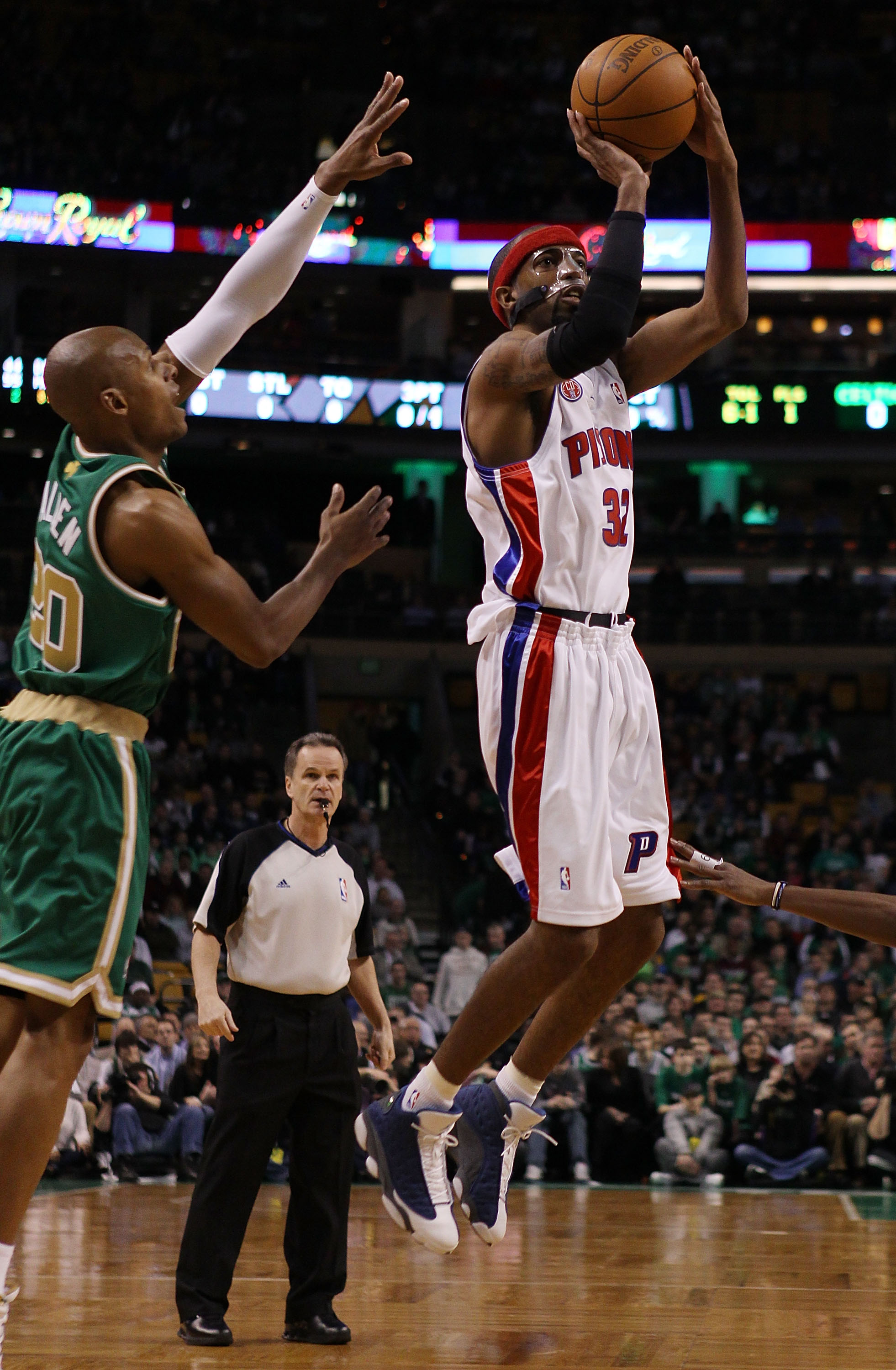
Rip Hamilton avoiding Ray Allen to get off a shot.
Elsa/Getty Images
After the departure of Chauncey Billups, Joe Dumars extended Rip Hamilton to a three-year extension that will pay him $12.65 million per year through the 2013 season, during which Hamilton will turn 35. Ignoring the fact that Hamilton is now under contract until his 35th birthday, $12.65 million is a ludicrous amount of money to pay for a one-dimensional player. No defense, no rebounding, no distribution, plenty of running, and plenty of set jump-shots does not equal $12.65 million a year. Ray Allen only makes $10 million a year with Boston. Confusing? But, the worst part about this transaction is what happened next.
---
No. 4: Signing Free Agent Ben Gordon After Extending Rip Hamilton's Contract
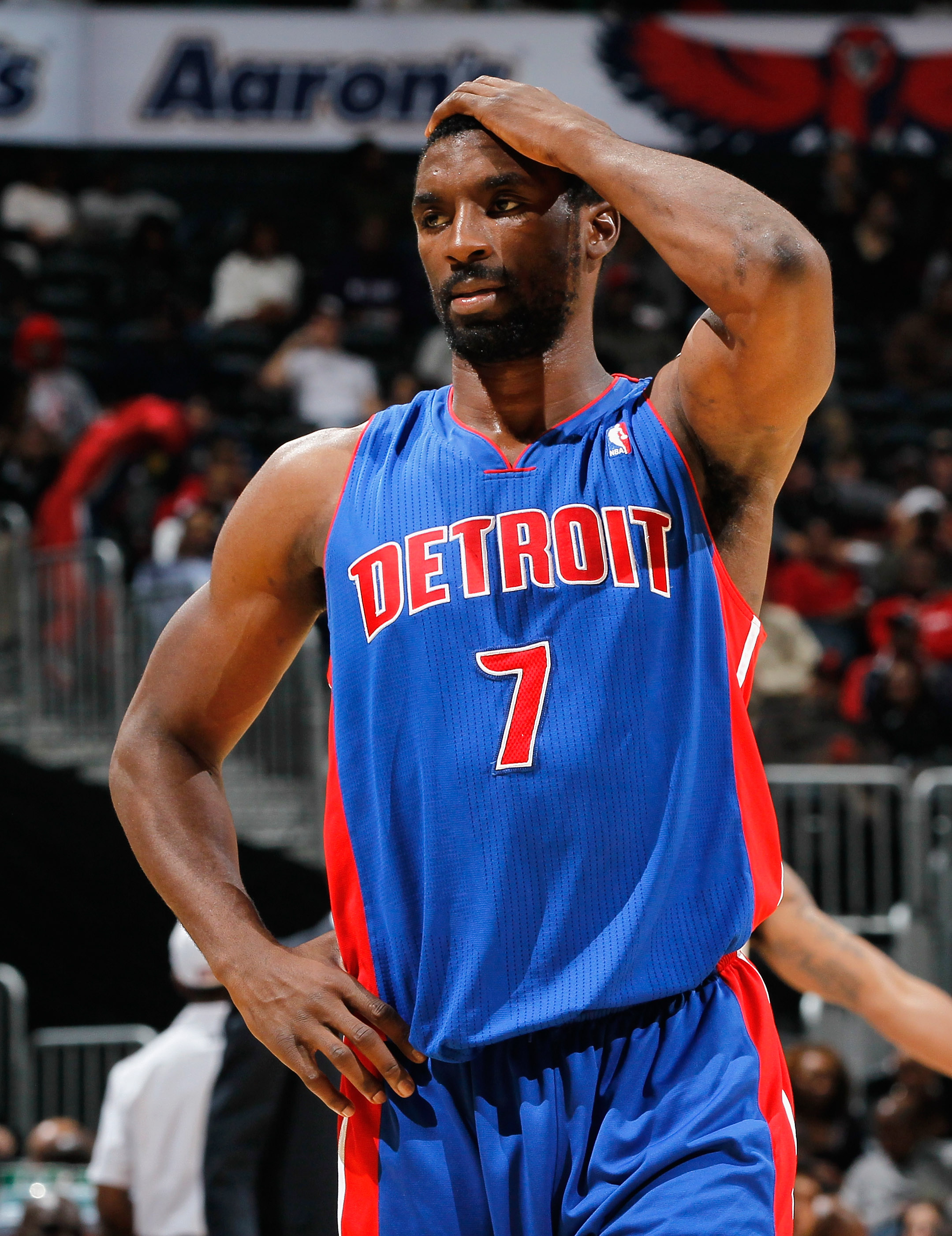
Ben Gordon of the Detroit Pistons.
Kevin C. Cox/Getty Images
Rip Hamilton, an offensive-minded shooting guard from the University of Connecticut who is rarely visible on the defensive end and rebounds as well as Steve Nash, received an extension during the 2008 season. Before the 2009 season, during free agency, Joe Dumars spent $55 million over five years in order to sign an offensive-minded shooting guard from the University of Connecticut who is rarely visible on the defensive end and rebounds as well as Steve Nash. Is Joe Dumars writing his own Twilight Zone episode here?
Let it be know that I think Ben Gordon is terrific. The legendary games against Ray Allen in the playoffs before he became a Piston dubbed him one of the league's most clutch performers. I love Ben Gordon, and as soon as Hamilton is dealt people will see how special Gordon can be.
The problem is that one or the other needed to happen, not both. Either you don't extend Hamilton's contract because you're going to sign Ben Gordon, or you do extend Hamilton's contract because you don't think Gordon is the answer. With more money during any given free agency period that Dumars had at his disposal, instead of bolstering the front court, he decided to purchase a mirror image of a player who was already under contract. As a result, the Pistons brought Ben Wallace back to Detroit to help sure up a pale front line that boasted Jason Maxiell, Charlie Villanueva, and Chris Wilcox.
Instead of signing free agent big men Marcin Gortat or David Lee, or making a run at guys like Lamar Odom and Paul Millsap, Dumars avoided the frenzy of 2010's free agency period by signing Rip Hamilton's ideal replacement, without remembering to get rid of Hamilton.
---
No. 3: Allowing Head Coach Larry Brown To Terminate His Contract Early
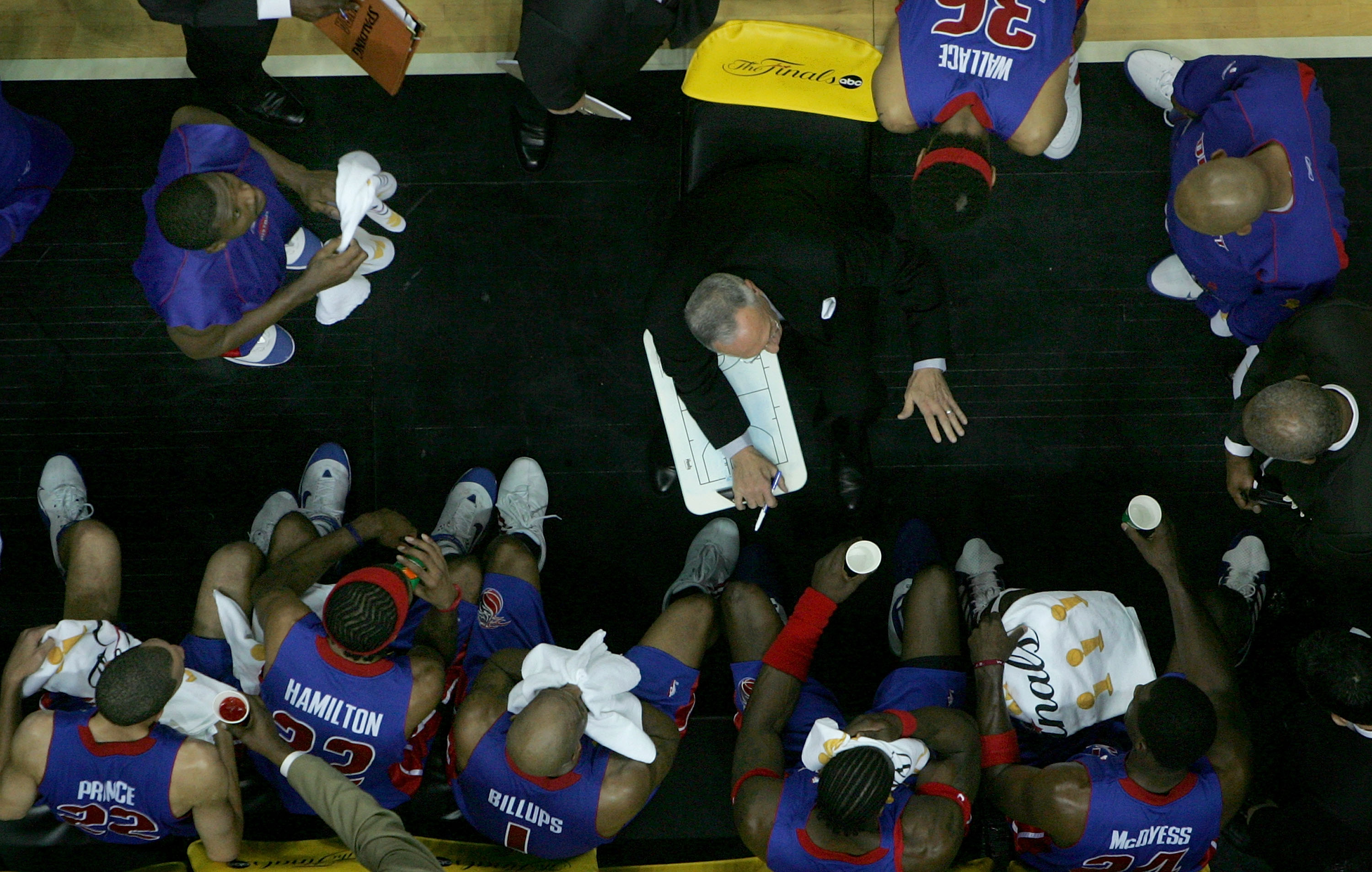
Larry Brown orchestrating his NBA Champion Detroit Pistons squad.
Stephen Dunn/Getty Images
Larry Brown coached the Pistons for two seasons; the first of which they won the NBA Championship and the second ended in a game-7 loss to the Spurs in the NBA Finals. For a two-year tenure it's hard to realistically expect a better scenario for Detroit fans. Brown was a coach who new how to handle the egos of Rasheed Wallace and Richard Hamilton while letting Chauncey be the leader that he is. The team had their edge with Brown. They were the "Bad Boys" at their best.
How on Earth did Joe Dumars not do everything in his power to keep Brown in Detroit for the remaining three years of his contract? Regardless of Brown's open discussions about taking over as Head of Basketball Operations for Cleveland, or flirting with the idea of landing in LA or New York to coach, he got the job done in Detroit.
Brown does have a history of being a flake in terms of coaching positions; he wasn't known for staying in one place for long. But, it's hard to imagine after an NBA Championship and the bitterness of finishing so close the following year, that Brown was begging to get away from such success. Something happened in the meetings with Joe and I'm sure Dumars was too proud to let a coach who mentioned other vacant positions while still employed for him to remain his coach. And that's a shame.
The following years brought the debacles of Flip Saunders, Michael Curry, and the still-unproven John Keuster. The three years which could have again seen Brown seated at the head chair on the Pistons bench eighty-two times a year failed to bring another Finals appearance, and despite their three Eastern Conference Finals appearances, the Pistons were never really close to contending for a championship. All three series' ended in game-six losses to the Heat, Cavaliers, and Celtics, respectively.
---
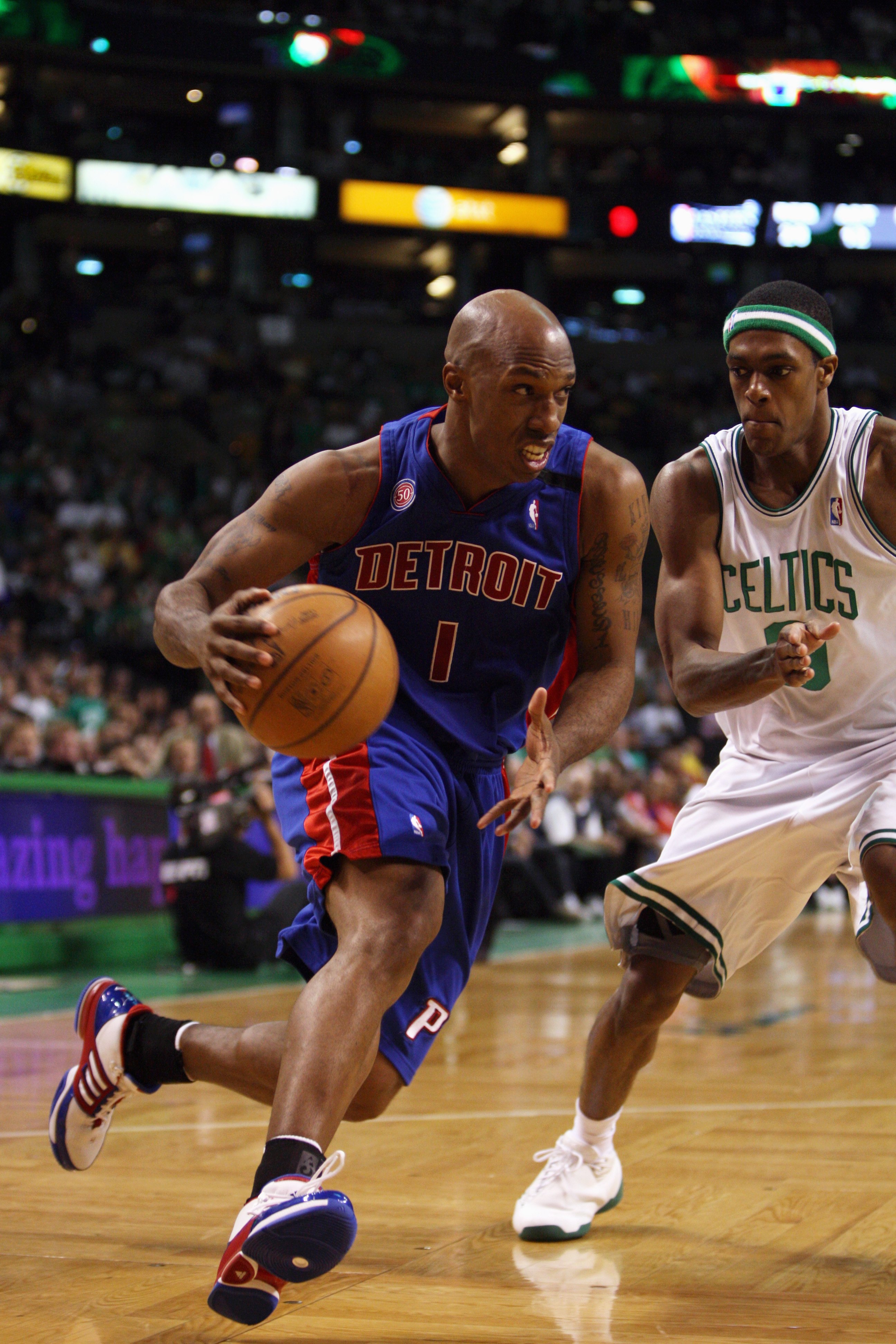
Chauncey Billups taking it baseline against Boston's Rajon Rondo.
Elsa/Getty Images
It isn't the acquisition of Allen Iverson, nor is it the eschewing of Chauncey Billups that hurt Detroit the most, it was the decision that the first piece necessary to move was Billups. Anyone who watched the Pistons understood that it was time to blow up that which brought the city such glory in the years prior. Ben Wallace had jettisoned upon declaring that the team had no heart left, and the remaining guys just weren't getting the job done. With the NBA moving back to its "star player" roots the Pistons lacked a true superstar who could draw the one million postseason fouls necessary in order to reach the NBA Finals. Something needed to change.
But, Chauncey? Was he really the first thing that needed to go? Not Hamilton? Not Prince? Not 'Sheed? Without their point guard the Pistons struggled to re-create anything close to their former success. The idea was to free up cap space, and Allen Iverson's bloated contract did just that. But is it ignorant to think that a package deal including Prince and Hamilton (before his extension) couldn't fetch a contract which would accomplish the same thing? With Chauncey, Rodney Stuckey, Ben Gordon and draft pick Austin Daye, the back court would have been far-more balanced than it is now with three shooting guards in Stuckey, Hamilton, and Gordon.
Chauncey's continued presence would have allowed for Stuckey to remain at his natural position of shooting guard while still allowing Ben Gordon to maintain his preferred role coming off the bench. With the poor forecast of Stuckey being a fit at point guard, Dumars took an ill-advised leap of faith which left this franchise scrambling for answers.
---
No. 1: Passing on 'Melo, Chris Bosh, and Dwyane Wade To Draft Darko Milicic
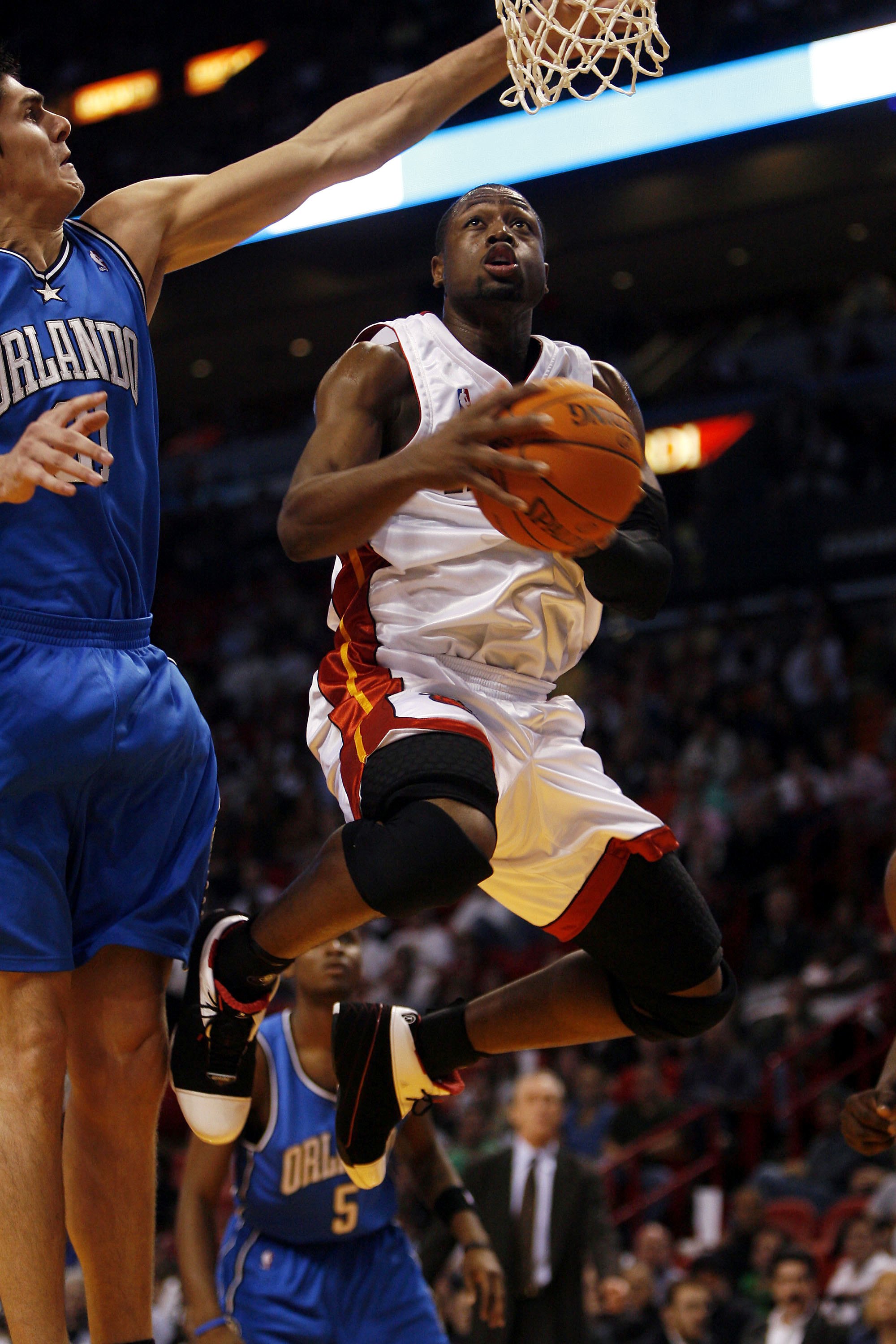
Dwyane Wade taking to the rack against fellow 2003 draftee Darko Milicic.
Eliot J. Schechter/Getty Images
The blunder of all blunders. Everyone knows the story. With Carmelo Anthony, Dwyane Wade, and Chris Bosh still on the board Joe Dumars elected to take Darko Milicic from Serbia with the second overall pick in the 2003 NBA Draft. What has long been considered the worst draft pick in NBA history has only been reinforced after Milicic's recent success. Not only did Dumars miss out on three of the league's greatest players in the last 25 years, he released the player he drafted in their place without getting a drop of production from him. Dwyane Wade has an NBA Title, LeBron is a two-time MVP, and 'Melo is a perennial All-Star. Regardless of the fact that we still won the NBA Championship the following year, and things may have turned out differently had the Pistons not drafted Darko, the prospect of multiple championships would be very realistic with any of those three players.
It's almost as cruel as a Ricky Gervais Golden Globe romp, but when you take the time to look even further down the draft board from 2003, it's painfully obvious how deep the talent pool was that year, and Dumars' selection looks even more idiotic. Other first-rounders Chris Kaman (No. 6 overall), David West (No. 18 overall), or Josh Howard (No. 29 overall) would have immediately bolstered the front court, and the additions of either Kirk Hinrich (No. 7 overall) or T.J. Ford (No. 8 overall) would have added some much-needed depth to the bench corps.


Commenti
Posta un commento